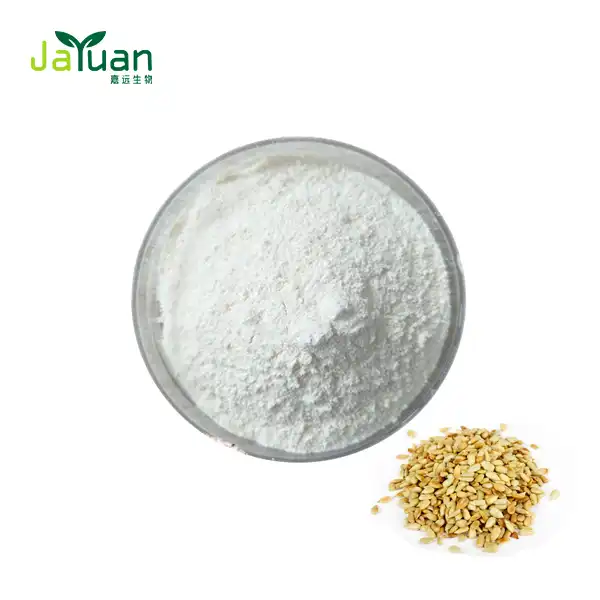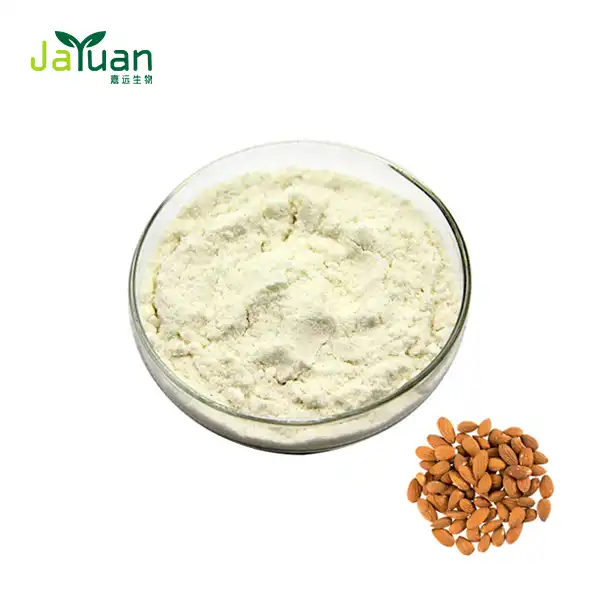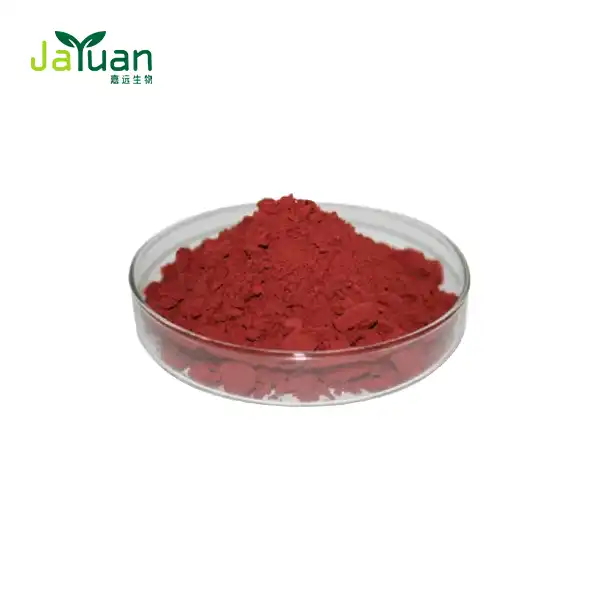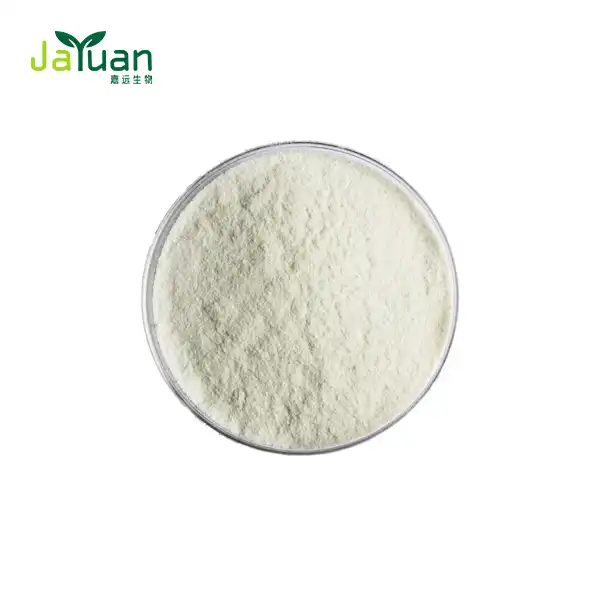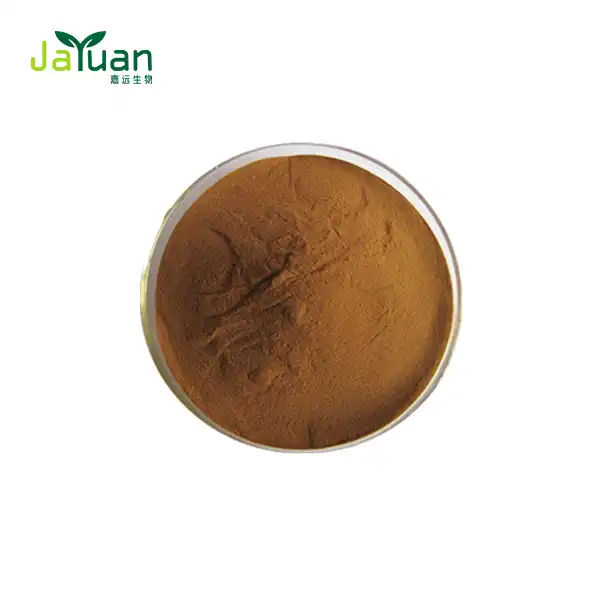Rosmarinic Acid Powder Benefits and Uses
Rosmarinic acid powder has been gaining attention in the health and wellness community for its potent antioxidant properties and wide-ranging benefits. This naturally occurring compound, found in various herbs and plants, offers a multitude of potential health advantages. In this comprehensive guide, we'll explore what rosmarinic acid powder is, its top health benefits, and how to use it effectively.

What Is Rosmarinic Acid Powder?
Rosmarinic acid is a polyphenol compound found naturally in various plants, particularly those belonging to the Lamiaceae family. This family includes popular herbs such as rosemary, sage, basil, and mint. Rosmarinic acid powder is a concentrated form of this compound, extracted and processed into a fine powder for easy consumption and use.
The chemical structure of rosmarinic acid (C18H16O8) contributes to its potent antioxidant properties. It's a water-soluble phenolic acid that exhibits a light yellow to brown color in its powdered form. Rosmarinic acid extract is known for its distinctive herbal aroma, reminiscent of rosemary.
Rosmarinic acid powder is prized for its high bioavailability, meaning the body can readily absorb and utilize it. This makes it an efficient way to harness the compound's potential health benefits. The powder form allows for versatile applications, from dietary supplements to topical preparations.
Top Health Benefits of Rosmarinic Acid
Rosmarinic acid powder offers a myriad of potential health benefits, thanks to its potent antioxidant, anti-inflammatory, and antimicrobial properties. Let's delve into some of the most notable advantages:
Powerful Antioxidant Effects
One of the most significant benefits of rosmarinic acid powder is its robust antioxidant activity. Antioxidants play a crucial role in neutralizing harmful free radicals in the body, which can cause oxidative stress and cellular damage. Rosmarinic acid has been shown to possess stronger antioxidant properties than several well-known antioxidants, including vitamin E and caffeic acid.
By combating oxidative stress, rosmarinic acid may help reduce the risk of various chronic diseases, including cancer and cardiovascular disorders. Its antioxidant effects also contribute to its potential anti-aging properties, helping to protect skin cells from damage and maintain overall cellular health.
Anti-Inflammatory Properties
Inflammation is a natural bodily response, but chronic inflammation can lead to various health issues. Rosmarinic acid powder demonstrates significant anti-inflammatory effects, which may be beneficial in managing inflammatory conditions such as arthritis, asthma, and certain skin disorders.
The anti-inflammatory action of rosmarinic acid is attributed to its ability to inhibit pro-inflammatory enzymes and cytokines. This property makes it a promising natural alternative for those seeking to manage inflammation-related health concerns.
Antimicrobial Activity
Rosmarinic acid exhibits broad-spectrum antimicrobial activity, making it effective against various bacteria and viruses. Studies have shown its efficacy against both Gram-negative bacteria like Escherichia coli and Gram-positive bacteria such as Staphylococcus aureus.
This antimicrobial property not only has implications for personal health but also for food preservation. Rosmarinic acid's natural antimicrobial action makes it a potential alternative to synthetic preservatives in the food industry.
Neuroprotective Effects
Emerging research suggests that rosmarinic acid may have neuroprotective properties. It has shown potential in protecting brain cells from oxidative stress and inflammation, which are factors implicated in neurodegenerative diseases like Alzheimer's and Parkinson's.
While more research is needed, these preliminary findings are promising for the potential use of rosmarinic acid in supporting cognitive health and potentially slowing the progression of neurodegenerative conditions.
Skin Health and Anti-Aging
The antioxidant and anti-inflammatory properties of rosmarinic acid make it beneficial for skin health. When applied topically or consumed, it may help protect the skin from UV damage, reduce signs of aging, and improve overall skin appearance.
Rosmarinic acid has been shown to enhance skin elasticity and promote collagen production, contributing to a more youthful appearance. Its ability to combat free radicals also helps prevent premature aging of the skin.

Potential Anti-Cancer Properties
While research is still in its early stages, some studies suggest that rosmarinic acid may have anti-cancer properties. Its antioxidant and anti-inflammatory effects may help prevent the formation and spread of cancer cells.
Rosmarinic acid has shown potential in inhibiting the growth of various types of cancer cells in laboratory studies. However, more research, particularly human clinical trials, is needed to fully understand its potential role in cancer prevention and treatment.
Cardiovascular Health
Rosmarinic acid may contribute to heart health through various mechanisms. Its antioxidant properties help protect blood vessels from oxidative damage, while its anti-inflammatory effects may help reduce the risk of atherosclerosis.
Some studies have also suggested that rosmarinic acid may help regulate blood pressure and improve lipid profiles, further contributing to cardiovascular health.
Respiratory Health
The anti-inflammatory and antioxidant properties of rosmarinic acid may be beneficial for respiratory health. It has shown potential in alleviating symptoms of asthma and other respiratory conditions by reducing inflammation in the airways.
Rosmarinic acid's ability to combat oxidative stress in the lungs may also help protect against respiratory damage caused by environmental pollutants and toxins.

How to Use Rosmarinic Acid Powder Effectively
To harness the benefits of rosmarinic acid powder, it's essential to understand how to use it effectively. Here are some practical ways to incorporate this potent compound into your health and wellness routine:
Dietary Supplements
One of the most common ways to use Rosmarinic acid extract is as a dietary supplement. It can be taken in capsule or tablet form, with dosages typically ranging from 50 to 200 milligrams per day. However, it's crucial to consult with a healthcare professional before starting any new supplement regimen, as individual needs may vary.
When choosing a rosmarinic acid supplement, opt for high-quality products from reputable manufacturers. Look for supplements that provide information on the concentration of rosmarinic acid and are free from unnecessary additives.
Culinary Applications
Rosmarinic acid powder can be incorporated into various culinary applications. It can be added to smoothies, juices, or teas for an antioxidant boost. The powder can also be sprinkled over salads or mixed into dressings for added nutritional value.
When using rosmarinic acid powder in cooking, it's important to note that high temperatures may degrade some of its beneficial compounds. For optimal benefits, add it to foods after cooking or in raw preparations.
Topical Applications
For skin health benefits, rosmarinic acid powder can be used topically. It can be mixed with carrier oils or incorporated into homemade skincare products like creams or serums. When using topically, always perform a patch test first to ensure you don't have any adverse reactions.
Some commercial skincare products also contain rosmarinic acid or extracts rich in this compound. Look for products that list rosmarinic acid or plant extracts known to be high in rosmarinic acid among their ingredients.
Aromatherapy
While rosmarinic acid powder itself isn't typically used in aromatherapy, essential oils from plants high in rosmarinic acid, such as rosemary and sage, can be used. These essential oils can be diffused or used in massage oils to potentially harness some of the benefits of rosmarinic acid.
Dosage Considerations
The appropriate dosage of rosmarinic acid can vary depending on factors such as age, health status, and specific health goals. While general recommendations suggest 50 to 200 milligrams per day for overall health maintenance, it's crucial to consult with a healthcare provider to determine the right dosage for your individual needs.
It's also important to start with a lower dose and gradually increase it while monitoring for any potential side effects. While rosmarinic acid is generally considered safe, some individuals may experience digestive discomfort or allergic reactions.
Potential Interactions
Rosmarinic acid may interact with certain medications, particularly blood thinners and drugs metabolized by the liver. It may also affect the absorption of iron. If you're taking any medications or have underlying health conditions, consult with your healthcare provider before using rosmarinic acid powder.
Quality Considerations
When purchasing rosmarinic acid powder, look for products that have been third-party tested for purity and potency. Choose suppliers who provide certificates of analysis and are transparent about their sourcing and manufacturing processes.
Store rosmarinic acid powder in a cool, dry place away from direct sunlight to maintain its potency. Always check the expiration date and follow the manufacturer's storage recommendations.
In conclusion, rosmarinic acid powder offers a wide array of potential health benefits, from powerful antioxidant effects to anti-inflammatory and antimicrobial properties. By understanding what it is, its benefits, and how to use it effectively, you can make informed decisions about incorporating this natural compound into your health and wellness routine. As with any supplement or new health practice, it's always best to consult with a healthcare professional before beginning use, especially if you have existing health conditions or are taking medications.
Are you interested in exploring the benefits of rosmarinic acid powder for your health or product formulations? At Xi'an Jayuan Bio-Tech, we specialize in producing high-quality natural plant extracts, including rosmarinic acid powder. Our team of experts can provide you with more information and help you find the right solutions for your needs. Contact us today at sales@jayuanbio.com to learn more about our rosmarinic acid powder and other natural extracts.
References
- Petersen, M., & Simmonds, M. S. (2003). Rosmarinic acid. Phytochemistry, 62(2), 121-125.
- Amoah, S. K., Sandjo, L. P., Kratz, J. M., & Biavatti, M. W. (2016). Rosmarinic acid--pharmaceutical and clinical aspects. Planta Medica, 82(05), 388-406.
- Bulgakov, V. P., Inyushkina, Y. V., & Fedoreyev, S. A. (2012). Rosmarinic acid and its derivatives: biotechnology and applications. Critical Reviews in Biotechnology, 32(3), 203-217.
- Nunes, S., Madureira, A. R., Campos, D., Sarmento, B., Gomes, A. M., Pintado, M., & Reis, F. (2017). Therapeutic and nutraceutical potential of rosmarinic acid-Cytoprotective properties and pharmacokinetic profile. Critical Reviews in Food Science and Nutrition, 57(9), 1799-1806.
- Swamy, M. K., Sinniah, U. R., & Ghasemzadeh, A. (2018). Anticancer potential of rosmarinic acid and its improved production through biotechnological interventions and functional genomics. Applied Microbiology and Biotechnology, 102(18), 7775-7793.
- Bhatt, R., Mishra, N., & Bansal, P. K. (2013). Phytochemical, pharmacological and pharmacokinetics effects of rosmarinic acid. Journal of Pharmaceutical and Scientific Innovation, 2(2), 28-34.

